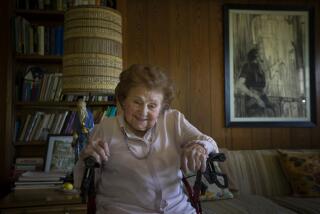Yukichi Chuganji, 114; World’s Oldest Man Since ’02
- Share via
Yukichi Chuganji, the world’s oldest man, died Sunday at the age of 114.
Chuganji died of natural causes at his home in Ogori, Japan, about 550 miles southwest of Tokyo, where he lived with his 72-year-old daughter, Kyoko, the only one of his five children to survive him.
Guinness World Records notified Chuganji about 20 months ago that he had become the world’s oldest man after the death on Jan. 4, 2002, of Italian Antonio Todde in Sardinia. Todde was born on Jan. 22, 1889, just two months before Chuganji’s birth on March 23, 1889, in the farming town of Chikushino.
“I did not expect to live this long, but I am glad to be the world’s No. 1,” Chuganji said at the time. “I can live on in health for a few more years, although I won’t be surprised if the Buddha’s messenger comes to take me at any time.”
Chuganji’s birthplace of Chikushino, like Ogori, is on Japan’s southernmost island of Kyushu, where Chuganji spent his entire life. The island is also home to the world’s oldest person, a woman named Kamato Hongo, who is 116.
The oldest fully authenticated age to which any human has ever lived is 122 years and 164 days, registered by Frenchwoman Jeanne Louise Calment, who died in 1997.
Japan, which has the longest life expectancy in the world, has an estimated 20,000 residents older than 100, with women making up about 80% of the total. Chuganji had been recognized as the oldest man in Japan since 2000.
Researchers have attributed the longevity of the Japanese to the country’s traditional fish-based low-fat diet.
Chuganji’s daughter has told news media representatives that her father hated vegetables, but enjoyed regular meals of beef, pork, chicken, rice, miso soup and milk. For a treat, he chewed caramels -- with some of his own teeth.
Asked last year about his secret to longevity, Kyoko said, “My daddy eats and drinks alcohol moderately. And he is an optimist.”
For the last three or four years, Chuganji suffered from failing eyesight and spent most of his time in bed. But his daughter said he had remained interested in current events and was “a little bit angry” when she told him about the terrorist attacks on the U.S. on Sept. 11, 2001.
Chuganji, who graduated from technical school in the early 1900s, worked as a silk worm breeder and instructor in the agricultural specialty and as a bank employee and community welfare officer.
In his 90s, he still rode a bicycle, and at 100 he was still reading newspapers and climbing ladders to prune trees.
In addition to his daughter, Chuganji is survived by seven grandchildren and 12 great-grandchildren.
More to Read
Sign up for Essential California
The most important California stories and recommendations in your inbox every morning.
You may occasionally receive promotional content from the Los Angeles Times.










